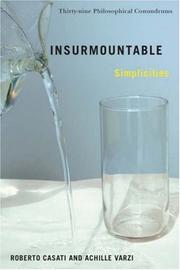| Listing 1 - 8 of 8 |
Sort by
|
Book
Year: 1884 Publisher: New York : Henry Holt and Company,
Abstract | Keywords | Export | Availability | Bookmark
 Loading...
Loading...Choose an application
- Reference Manager
- EndNote
- RefWorks (Direct export to RefWorks)
In this book, John Stuart Mill examines the philosophy of Sir William Hamilton and discusses the principal philosophical questions in his writings. The acknowledged position of Hamilton at the head of the school of philosophy to which he belongs, has principally determined Mill to connect with his name and writings the speculations and criticisms contained in the present work. The justification of the work itself lies in the importance of the questions, to the discussion of which it is a contribution. (PsycINFO Database Record (c) 2016 APA, all rights reserved).
Book
ISBN: 9780486238951 0486238954 Year: 1979 Publisher: New York: Dover,
Abstract | Keywords | Export | Availability | Bookmark
 Loading...
Loading...Choose an application
- Reference Manager
- EndNote
- RefWorks (Direct export to RefWorks)
Book
Year: 1563 Publisher: Printed at London : by Rouland Hall, for Iames Roubothum,
Abstract | Keywords | Export | Availability | Bookmark
 Loading...
Loading...Choose an application
- Reference Manager
- EndNote
- RefWorks (Direct export to RefWorks)
eebo-0055
Book
ISBN: 0394534913 Year: 1985 Publisher: New York (N.Y.): Knopf
Abstract | Keywords | Export | Availability | Bookmark
 Loading...
Loading...Choose an application
- Reference Manager
- EndNote
- RefWorks (Direct export to RefWorks)

ISBN: 0816612811 0816612773 Year: 1985 Publisher: Minneapolis (Minn.): University of Minnesota
Abstract | Keywords | Export | Availability | Bookmark
 Loading...
Loading...Choose an application
- Reference Manager
- EndNote
- RefWorks (Direct export to RefWorks)
Philosophical recreations --- Literary recreations --- Language games --- Recreations, Literary --- Amusements --- Recreations, Philosophical --- Games --- Literary recreations. --- Philosophical recreations.

ISBN: 1283007991 9786613007995 0231510403 9780231510400 9781283007993 0231137222 0231137230 Year: 2006 Publisher: New York Columbia University Press
Abstract | Keywords | Export | Availability | Bookmark
 Loading...
Loading...Choose an application
- Reference Manager
- EndNote
- RefWorks (Direct export to RefWorks)
"Perhaps not all the stories that follow are true. They could, however, be true, and the Reader is invited to ponder this. "So begins Insurmountable Simplicities, Roberto Casati and Achille Varzi's colorful incarnation of the many philosophical conundrums that hide in the wrinkles of everyday life. Why do mirrors seem to invert left and right but not up and down? How do we know whether strawberries taste the same for everyone? Where is it written that we must observe the law, and if it is not written, why should we observe it? What if we could swap brains-or the rest of our bodies? Insurmountable Simplicities is filled with stories, dialogues, and epistolary exchanges that cover a range of themes-such as personal identity, causality and responsibility, fortune, the nature of things, the paradoxes of time and space, the interface between logic and language-in captivating and inventive ways. Clear, concise, and intellectually engaging, this internationally acclaimed book brilliantly demonstrates that the beauty of philosophy resides in its thorough engagement with the simplicities of the world, insurmountable as they might initially appear.
Philosophy, Italian. --- Philosophy. --- Philosophical recreations. --- Questions and answers. --- Answers to questions --- Facts, Miscellaneous --- Miscellaneous facts --- Queries --- Question boxes --- Quiz books --- Trivia --- Encyclopedias and dictionaries --- Recreations, Philosophical --- Amusements --- Games --- Mental philosophy --- Humanities --- Italian philosophy --- Didactic fiction. --- PHILOSOPHY / General. --- Fiction
Book
ISBN: 3030653870 3030653862 Year: 2021 Publisher: Cham, Switzerland : Springer,
Abstract | Keywords | Export | Availability | Bookmark
 Loading...
Loading...Choose an application
- Reference Manager
- EndNote
- RefWorks (Direct export to RefWorks)
How would Plato have responded if his student Aristotle had ever challenged his idea that our senses perceive nothing more than the shadows cast upon a wall by a true world of perfect ideals? What would Charles Darwin have said to Karl Marx about his claim that dialectical materialism is a scientific theory of evolution? How would Jean-Paul Sartre have reacted to Simone de Beauvoir’s claim that the Marquis de Sade was a philosopher worthy of serious attention? This light-hearted book proposes answers to such questions by imagining dialogues between thirty-three pairs of philosophical sages who were alive at the same time. Sometime famous sages get a much rougher handling than usual, as when Adam Smith beards Immanuel Kant in his Konigsberg den. Sometimes neglected or maligned sages get a chance to say what they really believed, as when Epicurus explains that he wasn’t epicurean. Sometimes the dialogues are about the origins of modern concepts, as when Blaise Pascal and Pierre de Fermat discuss their invention of probability, or when John Nash and John von Neumann discuss the creation of game theory. Even in these scientific cases, the intention is that the protagonists come across as fallible human beings like the rest of us, rather than the intellectual paragons of philosophical textbooks. .
Philosophy. --- Economic theory. --- Philosophy, general. --- Economic Theory/Quantitative Economics/Mathematical Methods. --- Economic theory --- Political economy --- Social sciences --- Economic man --- Mental philosophy --- Humanities --- Imaginary conversations. --- Philosophical recreations. --- Recreations, Philosophical --- Amusements --- Games --- Conversation, Imaginal --- Conversation, Imaginary --- Dialogues, Imaginal --- Imaginal dialogues --- Conversation --- Dialogues
Book
ISSN: 24910570 ISBN: 9782364412439 2364412439 Year: 2018 Publisher: Dijon: EUD,
Abstract | Keywords | Export | Availability | Bookmark
 Loading...
Loading...Choose an application
- Reference Manager
- EndNote
- RefWorks (Direct export to RefWorks)
Gottfried Wilhelm Leibniz (1646-1716), esprit universel et promoteur des sciences, est à la fois philosophe, mathématicien et diplomate. Passionné par la langage et le monde, il cherche en encyclopédiste à rendre compte de toutes les inventions et de tous les savoirs. Lors de son séjour à Paris - quatre années pendant lesquelles il rencontre Huygens et étudie Pascal -, il conçoit, en 1675, un projet original de création d'académies, plusieurs spectacles de divertissement. Imaginant des mises en scène ou cherchant à régler la direction des casinos, le philosophe raisonne toujours en stratège. Pour lui, tout dans le monde est combinatoire. D'où son amour pour les jeux, qui associent signes et réseaux. Ainsi se dévoile une Europe savante et inventive qui anticipe notre monde relationnel et numérique.
Sciences --- Vulgarisation --- Leibniz, Gottfried Wilhelm --- Philosophy, German --- Theater and philosophy --- Play --- History --- Social aspects --- Leibniz, Gottfried Wilhelm, --- Communication in science --- Philosophical recreations --- Jeux philosophiques --- Entertainment events --- Philosophy --- Philosophy, German - History --- Play - Social aspects --- Entertainment events - Philosophy --- Leibniz, Gottfried Wilhelm, - Freiherr von, - 1646-1716
| Listing 1 - 8 of 8 |
Sort by
|

 Search
Search Feedback
Feedback About UniCat
About UniCat  Help
Help News
News